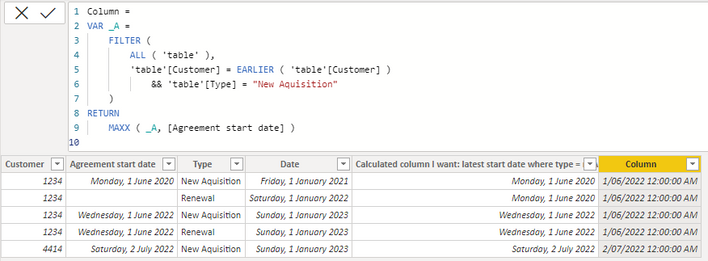Join us at FabCon Vienna from September 15-18, 2025
The ultimate Fabric, Power BI, SQL, and AI community-led learning event. Save €200 with code FABCOMM.
Get registered- Power BI forums
- Get Help with Power BI
- Desktop
- Service
- Report Server
- Power Query
- Mobile Apps
- Developer
- DAX Commands and Tips
- Custom Visuals Development Discussion
- Health and Life Sciences
- Power BI Spanish forums
- Translated Spanish Desktop
- Training and Consulting
- Instructor Led Training
- Dashboard in a Day for Women, by Women
- Galleries
- Data Stories Gallery
- Themes Gallery
- Contests Gallery
- Quick Measures Gallery
- Notebook Gallery
- Translytical Task Flow Gallery
- TMDL Gallery
- R Script Showcase
- Webinars and Video Gallery
- Ideas
- Custom Visuals Ideas (read-only)
- Issues
- Issues
- Events
- Upcoming Events
Compete to become Power BI Data Viz World Champion! First round ends August 18th. Get started.
- Power BI forums
- Forums
- Get Help with Power BI
- DAX Commands and Tips
- Re: Max Date of a previous month based on conditio...
- Subscribe to RSS Feed
- Mark Topic as New
- Mark Topic as Read
- Float this Topic for Current User
- Bookmark
- Subscribe
- Printer Friendly Page
- Mark as New
- Bookmark
- Subscribe
- Mute
- Subscribe to RSS Feed
- Permalink
- Report Inappropriate Content
Max Date of a previous month based on condition
Hello!
I've got a table with a series of months and values, like this:
| Customer | Agreement start date | Type | Date | Calculated column I want: latest start date where type = new acquisition and customer = same |
| 1234 | 1/6/2020 | New Aquisition | 1/1/2021 | 1/6/2020
|
| 1234 | Renewal | 1/1/2022 | 1/6/2020 | |
| 1234 | 1/6/2022 | New Acquistion | 1/1/2023 | 1/6/2022 |
| 1234 | 1/6/2022 | Renewal | 1/1/2023 | 1/6/2022 |
| 4414 | 2/7/2022 | New Acquisition | 1/1/2023 | 2/7/2022 |
It needs a calculated column because I'm trying to make it a matrix, where the rows are the start dates and the columns are the dates.
I've tried this, but get a circular dependency:
Solved! Go to Solution.
- Mark as New
- Bookmark
- Subscribe
- Mute
- Subscribe to RSS Feed
- Permalink
- Report Inappropriate Content
Hi @Anonymous
Try this, create the column
Test =
var _latest=CALCULATE(MAX('Table'[Date]),FILTER(ALL('Table'),'Table'[Customer]=EARLIER('Table'[Customer]) && 'Table'[Date] <= EARLIER('Table'[Date]) && 'Table'[Type] = "New Acquisition"))
return CALCULATE(MAX('Table'[Agreement startate ]),FILTER(ALL('Table'),'Table'[Customer]=EARLIER('Table'[Customer]) &&'Table'[Date]=_latest && 'Table'[Type] = "New Acquisition"))result
Best Regards,
Community Support Team _Tang
If this post helps, please consider Accept it as the solution to help the other members find it more quickly.
- Mark as New
- Bookmark
- Subscribe
- Mute
- Subscribe to RSS Feed
- Permalink
- Report Inappropriate Content
Hi @Anonymous
Try this, create the column
Test =
var _latest=CALCULATE(MAX('Table'[Date]),FILTER(ALL('Table'),'Table'[Customer]=EARLIER('Table'[Customer]) && 'Table'[Date] <= EARLIER('Table'[Date]) && 'Table'[Type] = "New Acquisition"))
return CALCULATE(MAX('Table'[Agreement startate ]),FILTER(ALL('Table'),'Table'[Customer]=EARLIER('Table'[Customer]) &&'Table'[Date]=_latest && 'Table'[Type] = "New Acquisition"))result
Best Regards,
Community Support Team _Tang
If this post helps, please consider Accept it as the solution to help the other members find it more quickly.
- Mark as New
- Bookmark
- Subscribe
- Mute
- Subscribe to RSS Feed
- Permalink
- Report Inappropriate Content
Perfect. great job.
- Mark as New
- Bookmark
- Subscribe
- Mute
- Subscribe to RSS Feed
- Permalink
- Report Inappropriate Content
Hi @Anonymous
Try this:
Column =
VAR _A =
FILTER (
ALL ( 'table' ),
'table'[Customer] = EARLIER ( 'table'[Customer] )
&& 'table'[Type] = "New Aquisition"
)
RETURN
MAXX ( _A, [Agreement start date] )
Output:
If this post helps, please consider accepting it as the solution to help the other members find it more quickly.
Appreciate your Kudos!!
LinkedIn: www.linkedin.com/in/vahid-dm/
- Mark as New
- Bookmark
- Subscribe
- Mute
- Subscribe to RSS Feed
- Permalink
- Report Inappropriate Content
Hi,
In this case, the first two rows are reporting the wrong dates, as the start date for the first row in your custom column is later than the agreement start date of that row.
- Mark as New
- Bookmark
- Subscribe
- Mute
- Subscribe to RSS Feed
- Permalink
- Report Inappropriate Content
Hi @Anonymous
You said, you want: latest start date where type = new acquisition and customer = same
four first rows in the table have the same customer number! so please check your post and update that with new description
Appreciate your Kudos!!
LinkedIn: www.linkedin.com/in/vahid-dm/
- Mark as New
- Bookmark
- Subscribe
- Mute
- Subscribe to RSS Feed
- Permalink
- Report Inappropriate Content
@Anonymous you can utilize this either as a measure or calculated column
Column =
VAR _mxCustomer = calculate(MAX(tbl[Customer]))
VAR _mxDate = CALCULATE(MAX(tbl[Agreement start date]),FILTER(ALL(tbl),tbl[Customer]=_mxCustomer&&tbl[Type]="New Acquisition"))
RETURN _mxDate
pbix is attached
- Mark as New
- Bookmark
- Subscribe
- Mute
- Subscribe to RSS Feed
- Permalink
- Report Inappropriate Content
Hi,
In this case, the first two rows are reporting the wrong dates, as the start date for the first row in your custom column is later than the agreement start date of that row.
if a customer has 2 "New Acquisitions" types, they'll have 2 different start dates.
Helpful resources
| User | Count |
|---|---|
| 16 | |
| 8 | |
| 7 | |
| 6 | |
| 6 |
| User | Count |
|---|---|
| 25 | |
| 13 | |
| 12 | |
| 8 | |
| 8 |




